So your doctor needs to get you 100% recovered immediately before you lose the first two groups of friends that Aristotle describes. DEMAND results or your doctor will use the craptastic saying; 'All strokes are different, all stroke recoveries are different'. You can't allow your doctor to hide and cower behind that useless saying.
Aristotle believes that there are three different kinds of friendship; that of utility, friendship of pleasure, and virtuous friendship.
and that you will likely lose all of the first two post stroke?
Want to Live Longer? Get Some Friends

Americans Lose Touch, Report Fewer Close Frien
The results show people with strong social relationships increased their odds of survival over a certain time period by 50 percent, the researchers say. That's on par with ceasing smoking, and nearly twice as beneficial as physical activity in terms of decreasing your odds of dying early.
The findings underscore just how important friendships are to our health, the researchers say.
"I think we make a compelling case that social relationships should also be taken quite seriously in terms of reducing risk of mortality," said study researcher Julianne Holt-Lunstad, a psychologist at Brigham Young University in Utah.
RECOMMENDED VIDEOS FOR YOU...
The researchers reviewed 148 studies that examined the link between social relationships and mortality. The studies involved more than 308,000 participants in total, and subjects were followed for an average of 7.5 years.
The studies measured social relationships in a number of ways. Some simply looked at the size of a person's social network or whether or not they were married or lived alone. Others assessed peoples' perceptions about their relationships, such as whether or not they felt others were there for them. And still others looked at how integrated people were in their social networks or communities.
Overall, high scores on measures indicative of strong social relationships were associated with increased odds of survival. The results held regardless of the person's age, gender, health status and cause of death.
In general, studies that took into account more than one aspect of a person's relationship (for instance, social network size and how integrated a person is with that network) were better predictors of mortality than those that only assessed one measure (such as whether someone lives alone).
Why are friends beneficial?
Our relationships can influence our health in a variety of ways, Holt-Lunstad said. For instance, they can help us deal with stress – a deadly pastime.
"As we encounter potentially stressful events in our lives, if we know that we've got people we can count on or that we can turn to, we may be less likely to even perceive it as stressful, because we know we can handle it," Holt-Lunstad said. "But also, let's say we're already in the throes of some kind of stressful event, our relationships can also help us cope with it and buffer that reaction to the stress."
Our friendships can also encourage healthy behaviors (and unhealthy ones) that have a direct impact on well-being. For example, our friends might encourage us to eat better, exercise, get more sleep or visit the doctor, Holt-Lunstad said.
Social relationships also provide meaning to our lives and might influence us to take better care of ourselves or take fewer risks, she said.
The work suggests such relationships are important from a public health perspective, and medical care professionals might consider recommending or promoting better social connections, the researchers say. Hospital and clinic staff might also try to involve their patients in social support networks during recovery, they say.
The results are published this week in the journal PLoS Medicine.
No comments:
Post a Comment